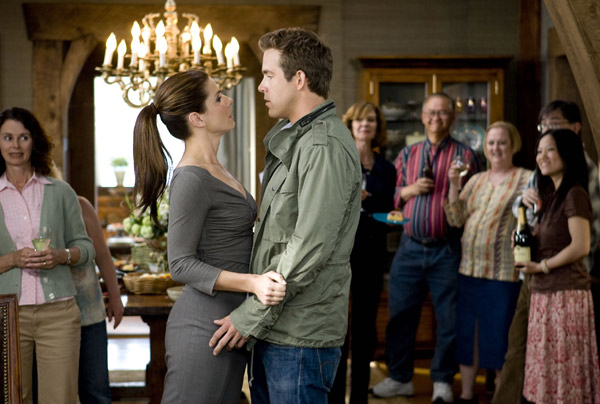 Overall Impression – Sparks fly in this gentle, goofy, funny movie.
Overall Impression – Sparks fly in this gentle, goofy, funny movie.
THE FOUR QUESTIONS
Who’s your main character? – Margaret.
What’s she trying to accomplish? – Professional: convince Andrew’s family and the INS that their upcoming wedding is genuine, and not a sham to secure her a US visa. Personal: become part of a real family. Private: overcome her fear of opening up emotionally.
Who’s trying to stop her? – Herself, INS Agent Gilbertson, Andrew’s dad, and to a lesser extent, Andrew.
What happens if she fails? – She’ll be deported to Canada, ending her life in the US and destroying her career. Andrew will be sent to prison, his family will be crushed, and his grandma would probably die from the shock.
THE FOUR ARCHETYPES
Orphan – Margaret is divorced from her emotions. She has no friends or family, her job is her life, and she’ll soon to be deported to Canada, leaving the only life she knows.
Wanderer – Margaret devises a plan to marry (temporarily) her assistant, Andrew, in order to secure a US visa and keep her job. However, INS agent Gilbertson suspects they’re committing fraud, so they have to convince him and everybody they know that the marriage is genuine. Margaret promises Andrew an editorial position for the risk he’s taking, and they’re off to visit his family… in Alaska. Margaret must learn about Andrew, soon realizing there’s more to him than she ever imagined. She also meets his family, including his loving mother, eccentric grandmother, and disapproving father. Margaret must also learn to cope both with being a city girl in remote Alaska, and being in a family for the first time since she was a kid.
Warrior – When Margaret and Andrew kiss to keep up appearances, they realize there might be a connection between them. As the wedding approaches, Margaret genuinely tries to get to know Andrew, open up about her past and personality, become part of the family, and fit in with the community.
Martyr – Margaret can’t bear to hurt Andrew and his family, so she comes clean about her scheme, sacrificing her professional life in the US.
AND, IN THE END…
THE PROPOSAL isn’t exactly groundbreaking in terms of the territory it (re)treads, but it does so with two great leads, real chemistry, Alaska, and a bunch of wacky humor. Seeing a fluffy white puppy get carried off by an eagle might just appeal to my sensibilities, but there’s plenty here for even non rom-com fans to enjoy.
As romantic comedies go, we all know Margaret and Andrew will get together in the end. The question is, how? Given everything that stands between them, how can they possibly get together? The elements that go into posing and answering that question form the meat of the story. In this case it might be: how can the nicest assistant in the world and his evil ice queen of a boss fall in love when he hates her and she couldn’t care less about him?
It’s a cool dynamic, except main characters need to be sympathetic, and Margaret’s not exactly likable. In fact, THE PROPOSAL spends much of its time portraying her as UNsympathetic. One way this was achieved was by having her cause undeserved misfortune – namely, picking on Andrew. A second way was by having her “kick the dog” – which means targeting something or someone helpless, often but not limited to animals, kids, or the elderly. Margaret “kicked the dog” pretty literally when she tried to feed that puppy to an eagle! The opposite goes for creating a sympathetic character: show that they’ve suffered undeserved misfortune and/or have them “pet the dog”.
By making us think of Margaret as a terror, the movie doesn’t just give us an enjoyably mean character, but it sets us up to (hopefully) be surprised and moved when it’s finally revealed that she is, in fact, extremely sympathetic. Margaret’s a meanie because her parents died when she was a kid, leaving her alone to fend for herself in a cruel world. Undeserved misfortune. She also bonds with Andrew’s grandma. That’s “petting the dog”.
If it strikes your fancy, have a look at similar movies and try to pick out those moments that help define a character as sympathetic or unsympathetic. The same goes if it’s a reveal that shows a character is actually sympathetic, when you were led to believe they were unsympathetic.
– Dan Pilditch
